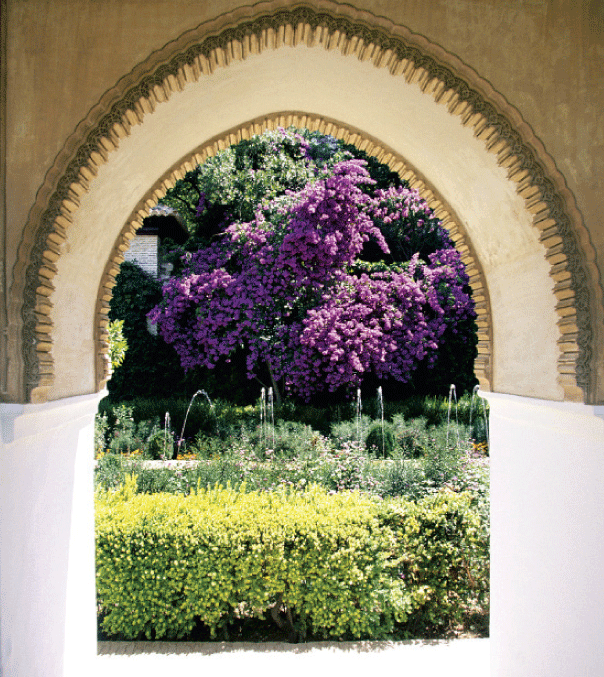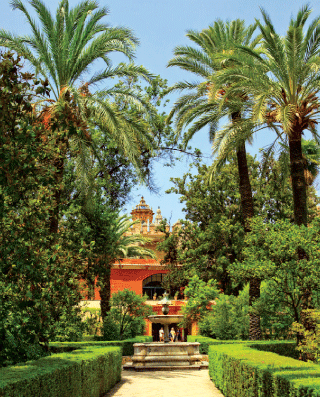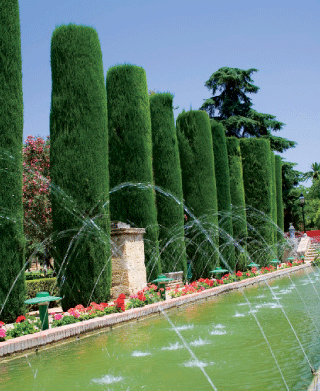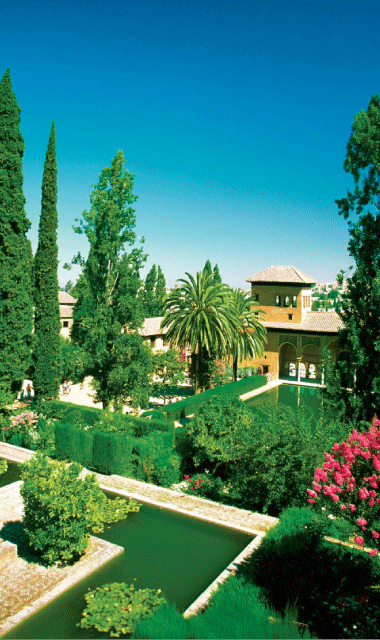
Gardens of Andalusia
Portraying the Islam
of Heritage and Traditions
 |
In Al-Andalus, gardens had more than just an aesthetic role.
The orchards grew aromatic plants, fruit trees and vegetables not only to please the senses of sight and smell, but also for agricultural purposes. This aspect introduces the contribution of the era to not only religion but also to enrichment of natural resources and food sources.
By Raina Abu Zafar
"Oh dwellers of Al-Andalus, what blessings you enjoy, water, shade, rivers and trees! The Garden of Eternal Happiness is not abroad but here in your lands: Could I but choose, this place would be my choice," wrote 11th and 12th century poet, Ibn Jafaya.
The people of Al-Andalus inherited this knowledge from their forefathers in the eastern Islamic world, and partly from their Roman forebears. Their proverbial thirst for learning led to major botanic and scientific developments. A true "green revolution" took place, which spread agriculture all over Al-Andalus and sowed the seeds of trade in agricultural produce.
Gardens, created by most Muslim dynasties in Spain, contributed to the Islamic heritage there as well.
"Medieval gardens in the world of Islam, of which only a small handful of graphic and literary descriptions have come down to the world, differed from region to region. Although influenced by local tradition, they were always designed around the spiritual concept of the garden of Paradise. Oriental gardens were related to the legendary Persian gardens in landscaping and decoration".
"The Umayyad dynasty brought to the Islamic West a love of gardens, blending eastern inspirations of broad horizons with the concept of walled gardens — which, according to the descriptions of the Qur'an — were equally attractive and suggestive," wrote the Islamic Cultural Foundation's editorial, Al Fadila.
With introduction of the impact of gardens in Andalus and Cordoba, the Islamic Cultural Foundation (FUNCI) in Madrid, under the guidance of its President, Cherif Abderahman Jah, launched an exhibition called the "Gardens of Andalusia" to convey "the peacefulness of co-existence among different cultures and of respect for the environment and historical heritage through one of the closest aspects to the everyday life of people: Nature and gardens."
The exhibition, which was organized by the Spanish Embassy in Riyadh in cooperation with FUNCI, was brought to Riyadh under the patronage of the Governor of Riyadh, Prince Salman.
Calling this endeavor an "invitation to intercultural dialogue and respect for the environment," the group of enthusiastic and committed Spanish Muslim ladies and gents refer to this project as a means to introduce Islamic heritage of arts, literature, and places as an awareness of the aesthetic and knowledgeable aspect of Islamic culture.
"Islamic civilization developed a culture of contemplating Creation and scientific research. 'Gardens of Andalusia' displays the achievements of a stage in the past, Al-Andalus, which constitutes a scientific and cultural paradigm that can still serve today… 'Gardens of Andalusia' is said to form a part of an International Cooperation Program set up by the Islamic Culture Foundation entitled 'Med-O-Med, Network of Botanic Gardens in the Mediterranean and the Middle East,' which aims to provide a framework for research, education and preservation of the environment, as well as the recovery of historic, botanic and acclimatized gardens in the Mediterranean and Middle East, including Saudi Arabia."
Ladies from this Spanish group belong to all walks and professions of life who contribute not only their professional experiences, but also their expertise as women and family-oriented members of the society to the project. Talking to some of them, one acquires the feeling that these ladies wish to go beyond the aesthetic impact of Islamic heritage to capturing the interest of other cultures and religious beliefs (especially of the coming generations) through the rich history of Islam in the fields of science, medicine, agriculture and other ground breaking inventions that are, to a large extent, attributed to the Western world.
The aims of the project include preservation of valuable natural resources from the Islamic past, the gardens of Palestine, for example, to not only protect, but make use of the growing interest in the environment. This leads to the fact that an impact of the practical present holds more interest for the modern explorers than a theoretical past.
Eniz Elexpuru, freelance journalist for El Paes and one of the directors of the group, along with Encarna Gutierrez, secretary general of the society, wish to foster the realities of Islam to young, questioning minds caught in conflict over world activities related to youth anger and confusion as to what is right or wrong.
Elexpuru believes that the new generation needs to be given commitment and responsibility in order to relate to and understand life. "Community work actually inspires youth more than any other," she says.
As an experiment, youth have been encouraged to work with the group to personally experience the richness of Islam as a culture and a historical power. According to the ladies, there is a growing fear and concern among young people, even in Europe, with regard to activities developing around the world with young people and Islam. This leads to questions such as "where does this anger come from?" and "what infuses this anger?"
It is believed that answers lie in awareness of the situation and changing focus, as positive trends leading to an "unraveling" of hitherto unknown but existing facts. These can be incentive to young people, in particular, in creating interest in understanding other ideologies. FUNCI members feel the growing need for awareness in European youth about the existing clash of cultures and ideologies.
"Our goal is, therefore, to introduce our project mainly through positive achievements in important fields, which deviate from the devastating and destructive image of it. This can play a strong role in helping to understand its greatness to a level of society, which does not really have clear concepts about it. Therefore, we wish to provide an opportunity to help youth learn and appreciate through our history and heritage. It is in this awareness and consequent learning that society can sponsor people's understanding and respect for one another."
"Exposure to cultures and traditional heritages are among means that can effectively convey the true image of an entire nation to a better understanding of a 'question' that looks beyond appearances to the roots of any culture. By providing a clear interpretation of ideologies to young questioning minds, we help to arouse not only an interest but also the basis of feelings, creeds and differences that exist and need to be sorted out and analyzed in order to be understood," added Elexpuru.
Societies and groups create communities that are peopled by like-minded and enthusiastic followers who act because they misinterpret reasons or lack clear objectives, which encourage vague beliefs and goals in order to influence developing minds. It is important to effectively create images and situations in order to destroy myths and foster truth. The group of women actively spearheading the aims and objectives of FUNCI as a means to presenting fundamentally the peaceful beauty and knowledge, as well as the expertise of Islam as a religion and a tradition, believe that by presenting what is the truth beyond the confusion, they can foster an in-depth concept of Islam as a great nation of thinkers, inventors and educationists.
Gutierrez, a practicing Specialist in Clinical Psychology who majored in psychology, entered Islam many years ago. She finds it a responsibility to preserve the "greatness and richness" of Islam by introducing practical ways to foster understanding and respect of it in anything but aggressive.
By reaching out to the people of all nations, they aim to close cultural and social gaps that they feel exist in the world today. In preserving the greatness and knowledge that is practical Islam through the tools of arts, literature, architecture and horticulture among others fields of excellence, they want to revive a great historical era in Spain, and beyond.